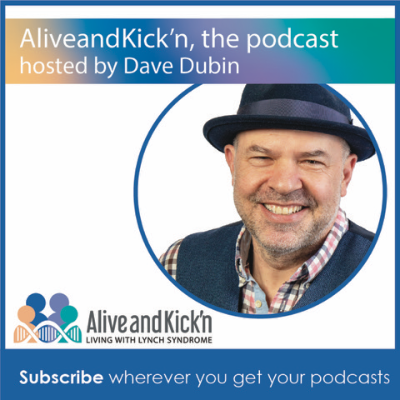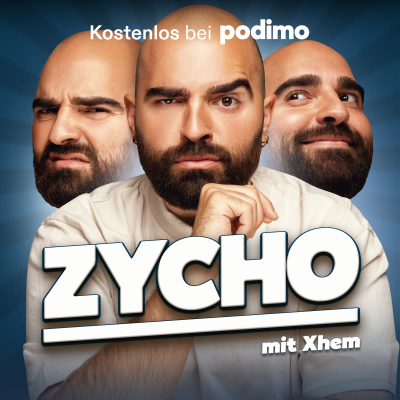
AliveandKick'n the podcast
Podcast von David Dubin
Nimm diesen Podcast mit

Mehr als 1 Million Hörer*innen
Du wirst Podimo lieben und damit bist du nicht allein
Mit 4,7 Sternen im App Store bewertet
Alle Folgen
159 FolgenI sit down with Dr Luis Diaz Jr, physican scientist at Memorial Sloan Kettering, and we share some history of mismatch repair, lynch syndrome and the evolution. Of course we talked about the primary rectal cancer study where they showed immunotherapy was curative for MMR/MSI High tumors. A second study for multiple cancer locations had 85% response rate and 40% had no side effects. Shout out of course to Dr Zsofia Stadler, my oncologist, working on another study of patients treated with immunotherapy, and if further cancers can be prevented. The future may be the Lynch Syndrome vaccine, but does the future also include immunotherapy before cancer for lynch syndrome patients? How about trying to turn non-lynch tumors into lynch (like) tumors so they can be treated with immunotherapy? Dr Diaz hopes other researchers can be bold moving forward, and that someday, this is all routine and these stories are no longer news.
I sit down with Dr Aparajita Singh, Gastroenterologist and Director of the Lynch Syndrome Center at UCSF, where it truly is a team effort taking care of Lynch Syndrome patients. Aside from me mispronouncing Lynch Syndrome, it was a wonderful engaging conversation. UCSF Lynch Syndrome Center should have the links to everything discussed, which was a lot. Check it out.
I sit down with Dr Timothy Yen, Gastroenterologist and Clinical Informaticist at Loma Linda University. Dr Yen was building the Lynch Syndrome program at Loma Linda when he discovered Epic Cosmos, where the Epic's Care Everywhere could be used for research, regardless of the health system. Epic Cosmos unlike other modules, isn't built around claims data. Now Dr Yen can pull de-identified data from thousands of patients, aggregate statistics and more. Cosmos is free for a health system to join, but they just need Care Everywhere. It also has a system to potentially connect lynch syndrome providers without breaking any privacy issues. Biggest barrier is going through the training and understanding how it works in order to do anything meaningful. As patients, we need to remind our physician offices to be specific in documenting our visits.
I sit down with Marina Udier, CEO of Nouscom, a Swiss company working on the Lynch Syndrome vaccine. Nous209 is designed to intercept tumors in Lynch Syndrome cancers. The 209 comes from the frameshifts of neoantigens, whether sporadic or hereditary. Idea is to educate the T-cells before cancers start forming. The data at AACR presented was very promising. They are also running a study on metastatic colorectal cancer patients, mostly without Lynch Syndrome, but MSI high. So how many people are tested positive for Lynch Syndrome each year? Next steps includes additional investigators and patients for a much bigger trial, at a time to be determined, and of course funding is always a priority. Suffice it so say, interest is high is seeing this come to late stage development.
I sit down with Dr Aasma Shaukat, Gastroenterologist and Professor of Population Health, who is also trained in Epidemiology and Clinical Research, and Director of GI Outcomes Research at NYU Langone Health, Grossman School of Medicine. We talk about progress in healthcare fields including gastroenterology. We talk microbiome (I compared my digestive tract to the ocean). We did talk colonoscopy prep in quite a bit of detail. We also talk about screening rates in the NYC area< C5 and how fortunate we are to work and live in an area that really tries to be inclusive and proactive. Gastroenterology has incorporated AI tools, so far in polyp detection, but also summarizing patient history and creating a whole picture, which is also helpful in oncology and more. Note that this was originally recorded just after the New Year in early January.























